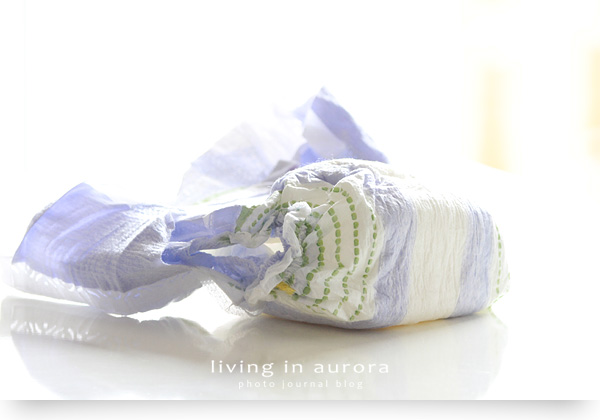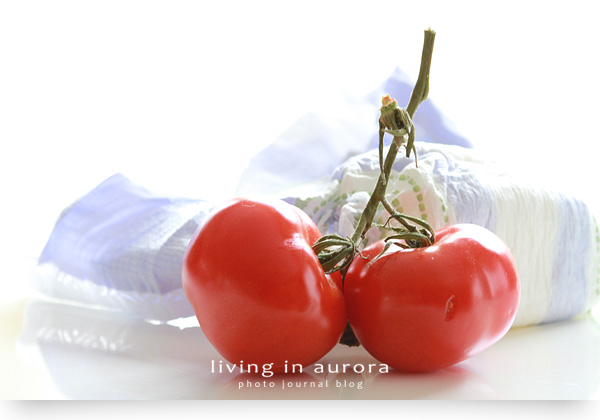Placing diapers in the compostable bag – I am not convinced. I would rather put diapers in the ‘compostable‘ bag that aids in decomposing the content within. Still, I am not convinced that diapers should be going to the green bin at all. I did some searching on the net, and I thought I would express here in this post how I feel about the green bin program and introduction of the compostable bags.
The very angry feeling I have is that it’s just another cost passed on to the consumer. Never mind I feel for the dog owners, according to York Region’s Green Bin Program FAQ – pet owners will have to use the compostable bags for pet waste.
York Region’s Green Bin program defines the difference between compostable and biodegradable products, and organic waste as follows:
What is the difference between compostable and biodegradable? Biodegradable plastic bags are made with a chemical additive that breaks down the plastic film into smaller pieces. These smaller pieces will not compost and become a contaminant in the finished compost. Compostable bags are made from plant-based materials that will break down entirely into compost.
What is Organic Waste? Organic materials are compostable, meaning they break down naturally using micro-organisms found in the natural environment to make compost, a nutrient-rich, soil-like material that enhances soil structure and improves plant growth when added to your garden or landscaping project. Food, yard waste, certain paper products, and pet waste are all considered organic materials.
Note: diapers are not mentioned in the organic waste.

Definitions are simple and clear. Now let us look at the diaper company Pampers and how they talk about their sustainability initiatives:
Can you compost Pampers diapers? For safety reasons, used diapers and other personal care products are not suitable for home composting systems. They are generally compatible with commercial-scale composting, such as mechanical-biological treatment facilities.
Now according to the Green Bin Program, we do not have such a mechanical-biological treatment facility, just a biological one.
Note that some diapers have cloth-like cover material and Velcro-like fasteners. I don’t know about you, but I have trouble understanding how Velcro-like fasteners can be compostable?
Okay, here is the Green Bin program composting process defined.
How Does it Get Processed? Existing microorganisms in the food waste break down the material naturally, producing compost. The material goes through an initial rapid breakdown known as the thermophilic stage. This process creates heat that pasteurizes or sterilizes the compost, ridding the material of any pathogens or harmful bacteria. It’s this pasteurization phase that allows York Region to accept animal feces and diapers in its green bin and still produce compost that’s safe to use.
The only good thing about the process I find is that it pasteurizes or sterilizes the compost. Still, I am not convinced how this process will decompose the personal hygiene products that include diapers and sanitary products. I looked up Kotex for hygiene products and I couldn’t find any references that their products are biodegradable or compostable.
Definitely, there are flaws with every system that claims to be environmentally friendly. The good thing is that we are doing something. Something is always better than nothing, but that something better not end up in my garden because I am still not convinced about the hygiene products in the green bin.
Wait, I think I found something here as I read Compostable Bag Frequently.
Does York Region still accept diapers in plastic bags? Diapers bagged in plastic film, such as the plastic used in the Diaper Genie, are not acceptable in the green bin. We strongly encourage residents to place their diapers in the green bin using a compostable bag. The other option for diapers bagged in plastic is to place them in the garbage.
Oh, back to the landfill. Never mind if we double bag our compost now, their very first mechanical screening process cannot handle double bags, so it goes to the landfill. I just wonder how efficient their process is at all? That is how much of our compost really gets to be composted.
And just in case you did not know, there will be some odour with compostable bags. Oh no, more odours than what I have now! However, they have a solution, unfortunately for travellers only.
Will there be more odours with compostable bags? The material you are collecting in the compostable bag is the same material you were collecting in plastic bags. As with any bag, if organic waste is left too long, it may produce an odour. It is recommended that you empty your in-house kitchen container regularly. If you know you will be away for a while, an option is to store your organics in the freezer until collection day to reduce the chance of odours.

I sound like a broken record, but technically, I am not convinced that York Region’s Green Bin program is effective as claimed. The introduction of compostable bags is just another cost passed on to consumers. Manufacturers and retailers will make money regardless. The meaningless logo is undoubtedly a money maker. Now, with compostable bags, the mechanical screening process should be eliminated – a smart cost reduction step at the processing facility. Aha, there is an idea – I demand free compostable bags provided to us.
COMMENTS
Elizabeth Bishenden said: April 22, 2011 at 20:02
“Anna, you are completely correct to have some questions. Most of the materials in disposable diapers and personal hygiene products (feminine hygiene and adult incontinence products) are organic polymers and they are not compostable. I use the term organic in its definition by chemists, not its definition by non-chemists. The main absorbent in disposable diapers, feminine hygiene products, and adult incontinence products is a plastic called sodium polyacrylate. It can absorb a lot of water, but it doesn’t actually break down in the composting process. My litmus test for what I put in the green bin is “Was it alive or did it come from some living thing?” We put in a lot of dog poop, dinner table rejects (bones, leaves, stems and crusts) and some nose wipe tissues. As for plastics, they go in the garbage unless they are labelled recyclable.”
Elizabeth Bishenden said: May 1, 2011 at 23:46
“I re-read this post this evening and I’m wondering why you want free composting bags. They are available at various retail outlets. They range from $6 for about 10 large liners for your green bin to $5 for 10 medium liners for your kitchen compost bin to $10 for some small bags suitable for pet poop. I’ve already posted about why your diapers and feminine hygiene products shouldn’t be in the compostable waste. If you want cheap waste disposal, go ahead and put everything into the same bag and buy big black bags from a big box store. No one will know except you what is inside.
Part of dividing the waste stream materials is asking people to be responsible for what they use, or dispose. Part of responsibility is acknowledging the waste we pay for by being consumers. Much of the waste reduction seems to be both asking ourselves what waste we produce and asking the people who provide us with goods and services how they plan to reduce waste. Sometimes we need to reduce waste by not buying something in the first place.”
Anna Lozyk Romeo said: May 3, 2011 at 23:15
“Elizabeth, thank you for your valuable input in both comments. I wasn’t sure if you wanted me to reply to the first one. I wasn’t too serious about the free bags; it is, in fact, wishful thinking. However, that wishful thinking is because I think the system has a fundamental flaw, the diapers, and hygiene products as per my post.
I find it ironic that they are making a big deal about it taking 1000 years for the plastic bag to break down, but what about the Velcro on the diapers and other little things that are not compostable? About 40 diapers can go into one compostable bag that weighs only 11 grams versus 40 x 36 grams (dry weight) per diaper.
Why is so much money going into advertising just so we can start using the compostable bags? I would have been happy with a single mail notice or magnet that can stay on my fridge.
I know it is a recyclable box, but why not put all the bags in the compostable bag?
Now with the introduction of the compostable bags, the sorting system should be more efficient. The Green Bin Program stated that if the bag cannot be opened at the first stage of composting, then that bag goes to the landfill. So with the new system, the process should generate more compost. Efficiency translates to less operating cost and better output. At this point, I thought that giving about 2 free bags per household would have been a good idea, or getting them for less from the town just because of the efficiency.
Elizabeth, don’t get me wrong, in the end, I do not have a choice but to follow the rules. I will put diapers and hygiene products as recommended (not in the black garbage bag) because at least it is sterilized. My conscious mind will never let me mix the compost with garbage. I grew up when we would separate compost from garbage even though here in Canada at some point all went to the same landfill. I was very happy with the arrival of the green bin program. It felt good to do the right thing again. Surprised that it took that long. Sometimes I just have hard time to pay for somethings which do not make sense … Thanks for your comments again.”